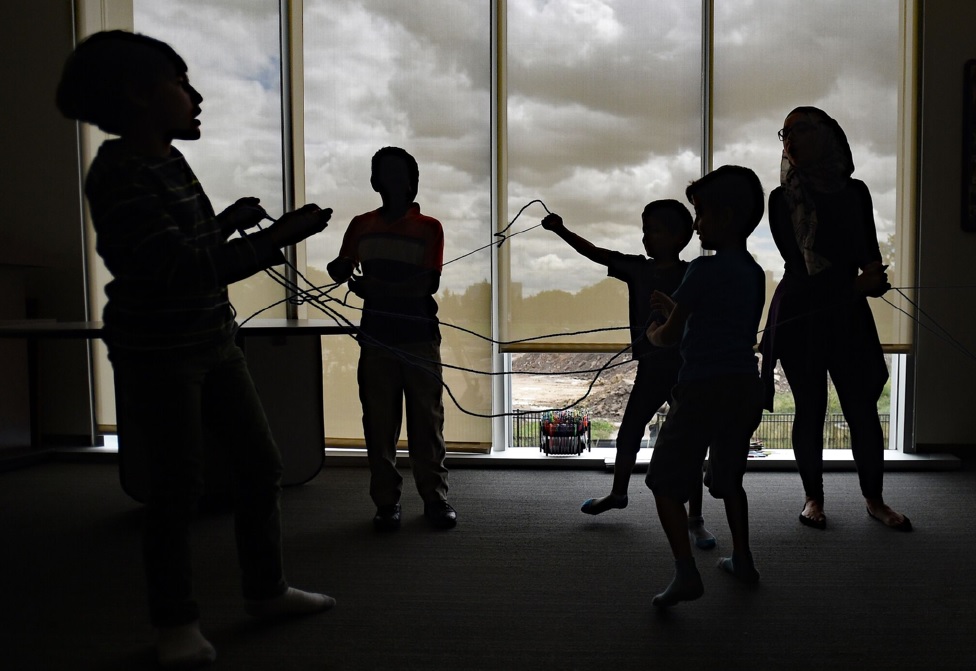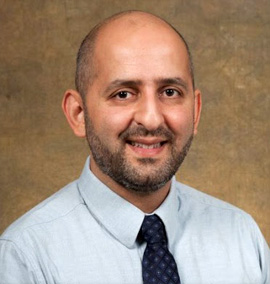
Nearly four years ago, Arash Javanbakht, M.D., launched an unprecedented study exploring the mental health impact and biological correlation of war trauma on Syrian refugees now living in the United States.

The work was a labor of love, with dozens of researchers traveling to the homes of refugees to interview mothers, fathers and children fleeing war.
“It’s the work of many people. A lot of them are volunteers, and the initial team was a group of Iraqi refugees themselves,” Dr. Javanbakht said. “There was a lot of love in this work.”
In those four years, Dr. Javanbakht and team have presented analysis of the collected data at 10 national and international conferences. Now, with a new five-year, $2.7 million grant from the Eunice Kennedy Shriver National Institute of Child Health and Human Development of the National Institutes of Health, he will follow the families for years to measure the effects of trauma over time.
“We can now continue this work with these kids and have more solid data to show what is happening to these families. This is the first time that such a serious look is being done in a group that’s not white, black or Hispanic. It brings a more global view,” he said. “This is a very unique group. We can have a better look at how the fathers’ stress affects their children. They all went through this similar experience of war, camps, migration and post-migration stress.”
Dr. Javanbakht is an associate professor of Psychiatry and Behavioral Neurosciences and director of the Stress, Trauma and Anxiety Research Clinic.
Project co-investigators are Department of Psychiatry and Behavioral Neurosciences Professor and Chair David Roseberg, M.D., the Miriam L. Hamburger Endowed Chair of Child Psychiatry; and Professor Tanja Jovanovic, Ph.D., the David and Patricia Barron Chair for PTSD Neurobiology.
In recent years, evidence from other research projects has shown the serious detrimental impact of childhood trauma exposure on child and adult physical and mental health, yet it was mostly based on retrospective studies of traumatized adults, Dr. Javanbakht said.
“Prospective longitudinal studies in children are necessary to determine the impacts of trauma on neurobiological development. Furthermore, effects of trauma are not static, and may oscillate based on environmental factors affecting neurobiology of traumatic stress,” he said.
Examining the longitudinal course in trauma-related symptoms in children will help identify biological and environmental factors contributing to vulnerability and resilience. While parental and environmental factors have an impact on stress in traumatized populations, the biological mechanisms of this transmission aren’t clear.
“We want to know if we can use the information to see who may get better and who will get worse as time goes by and get a predictive value to see who we should help to get the best outcome,” he added.
The researchers will use the existing cohort of Syrian and Iraqi refugee children ages 7-17 and their parents who settled in the United States starting in 2016, exploring longitudinal changes in symptoms of anxiety, depression and posttraumatic stress disorder, as well as resettlement and the epigenetic, autonomic and environmental correlates.
Within a month of their arrival in the U.S., the cohort showed high rates of rates of anxiety, and their parents displayed high rates of PTSD and anxiety.
The researchers will follow the cohort for three years, collecting self-reported measures of anxiety, depression and PTSD, saliva DNA samples, and skin conductance response as peripheral markers of sympathetic arousal. They will compare the symptoms and biomarkers with those of a group of Arab immigrant children without war trauma exposure.
This is the first study to examine the course of illness, epigenetic, autonomic, and environmental correlates of stress and trauma among Syrian refugee children and their parents. The study shows the known developmental timing of trauma exposure and availability of assessments immediately upon arrival, as well as the ability to follow up the children longitudinally during development.
The possibility of finding unique epigenetic changes, as well as most important environmental and parenting risk factors, promises to advance efforts to improve child outcomes and reduce risk for later mental and physical health problems associated with childhood trauma and stress.
“This knowledge will not only be useful in providing better health services to this specific population in need, but also in increasing our more general understanding of trauma and environmental impact on child development and psychopathology,” Dr. Javanbakht said.
The grant number for this award, “Biological and Environmental Factors Affecting Risk and Resilience Among Syrian Refugee Children,” is R01HD099178-01. The project is also supported by funds from the Children’s Hospital of Michigan Foundation, DMC Foundation, Blue Cross Blue Shield of Michigan Foundation, Lycaki/Young Funds, WSU Department of Psychiatry and Behavioral Neurosciences, and an anonymous holocaust survivor.
Research team members include Zainab Abdulhameed, Hiba Abu Suhaiban, Farah Alani, Zeina Al-Obaidi, Tarek Almsaddi, Alireza Amirsadri, Sallen Aoghiz, Heba Al-Saghir, Mohammed Alsaud, Kamal Al-Shalby, Sulaf Al Shorji, Cynthia Arfken, Shahira Baajour, Celine Bazzi, Paul Burghardt, Michelle Canton, Dina Charara, Anthony Denha, Holly Feen-Calligan, Lana Grasser, Michael Kabbash, Hana Kallabat, Luay Haddad, Nour Hamoud, Kimberly Hassan, Dalia Khalil, Israel Liberzon, Suzanne Manji, Dalia Mammo, Raveena Mata, Ed Mischel, Luna Nasry, Sara Nasser, Heba Osman, Linda Saab, Bassem Saad, Dalya Saleem, Sara Salim, Rajaa Shoukfeh, Samantha Sonderman and Cassandra Wanna.
Participating organizations include the Arab American Chaldean Council, Samaritas, Center for Yoga in Ann Arbor and the Hype Recreation Center in Dearborn.